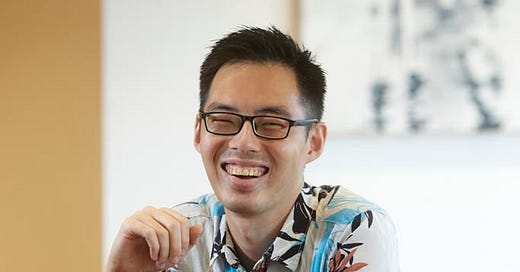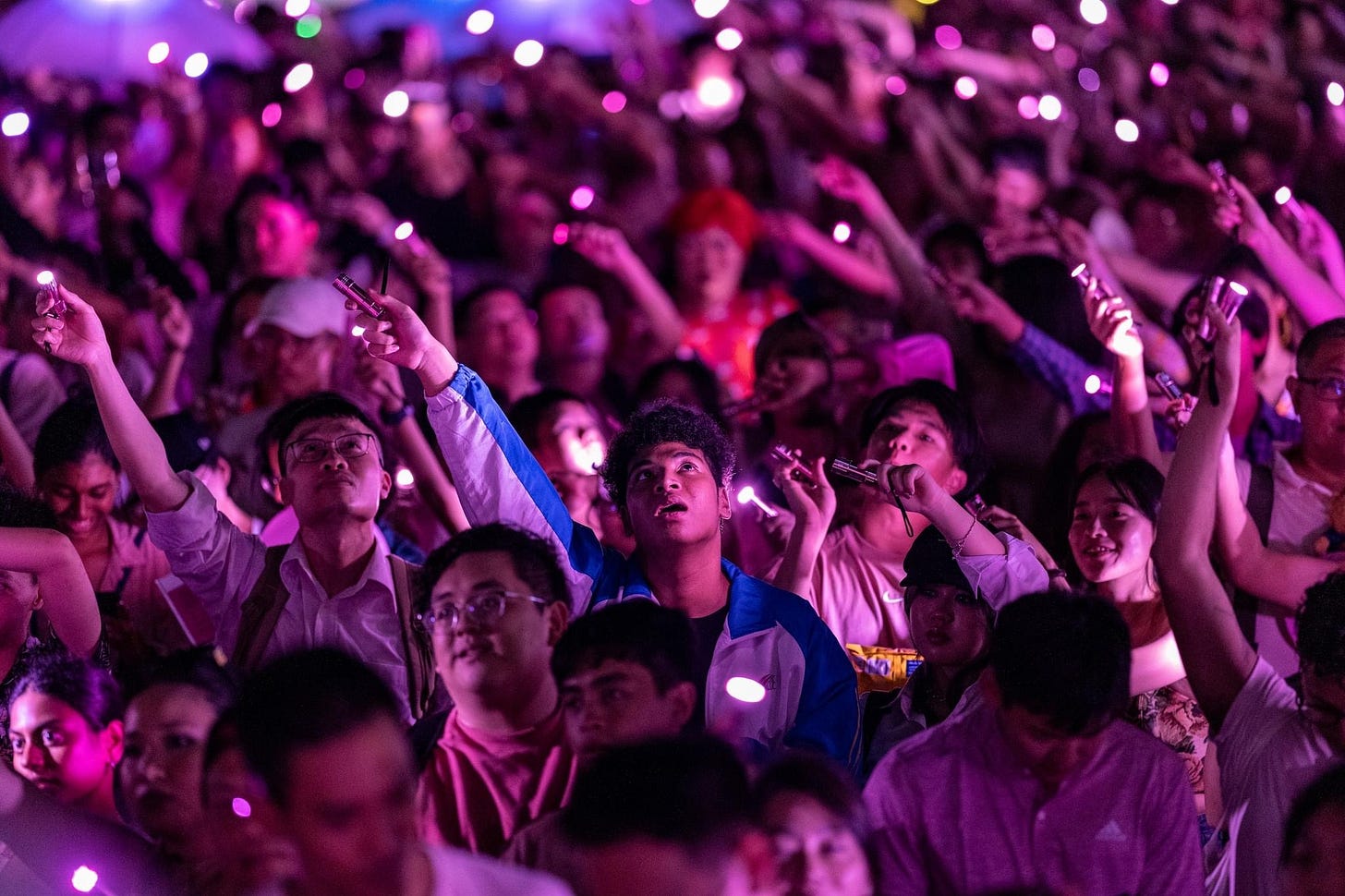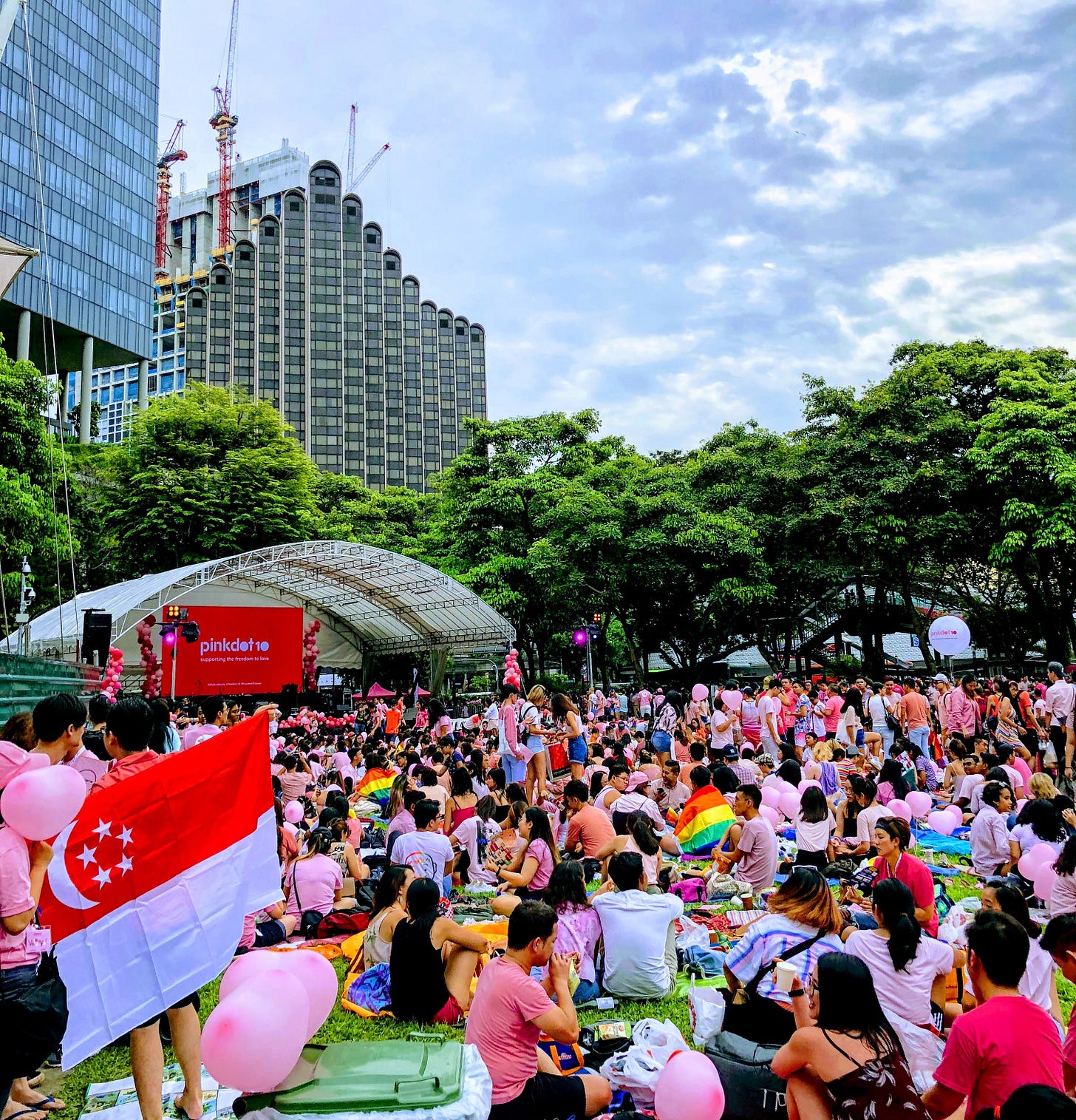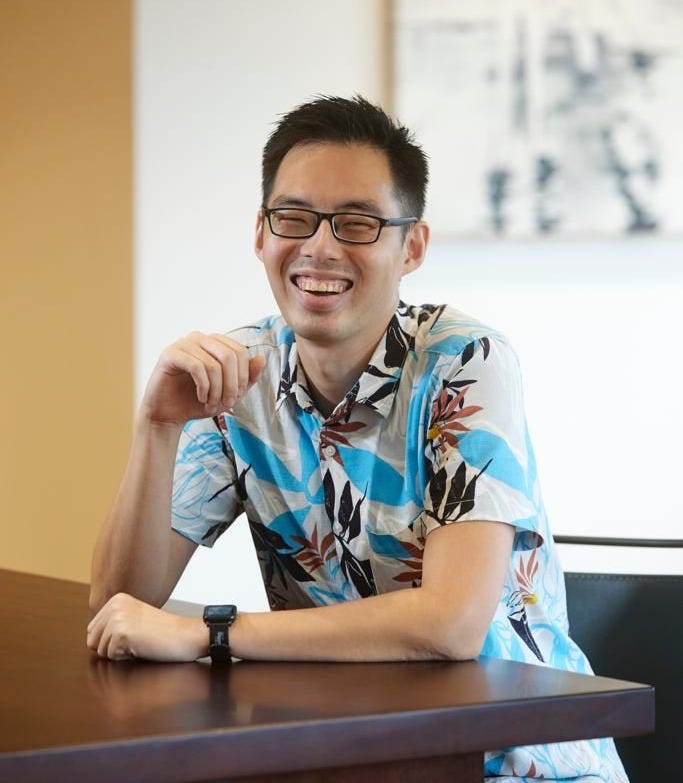🗣️ Our Voices, Our Votes: Sherman 🗳️
"When society accepts us, the legal frameworks will naturally follow… That acceptance matters more than anything." - Sherman Ho, he/him, 35-44
As we get closer to GE2025, I have been thinking a lot about whose hopes, worries, and dreams we hold and whose we leave behind. Our Voices, Our Votes is my small attempt to make more space for LGBTQIA+ Singaporeans to share what is on their minds. This is an invitation to slow down, to listen a little more carefully to different lived experiences, and to stay open-hearted to what we might learn along the way.
You might know Sherman as the co-founder of Happiness Initiative, but in this conversation, he opens up about what he hopes to see in Singapore’s future. For him, good leadership means clarity, compassion, and the courage to connect across differences.
He speaks candidly about housing, mental health, and the quiet gaps that still shape queer lives today. Change, to Sherman, isn’t just about policy; it’s about building a society where everyone feels seen, supported, and respected.
Sherman Ho, (he/him,), gay, 35-44
Q: To start us off, how are you feeling about the upcoming elections? Have your thoughts or decisions shifted since you first filled out the survey?
A: I’d say my thoughts haven’t really changed. For me, it's never just about whether someone is from the PAP or the opposition. It comes down to competency. At the end of the day, this person is representing Singapore on a national stage. In Jurong, the candidate contesting doesn’t seem very visible. I haven’t seen her around much, and based on that, she’s probably not someone I’d be inclined to support.
Q: I appreciate your honesty. Would you say the survey helped clarify your decision at all, or had you already made up your mind beforehand?
A: I’d already made up my mind before doing the survey. Once I looked into who the candidates were, the decision came pretty quickly. Honestly, in Jurong, the opposition isn’t very strong. It’s not like in the East, where you’ve got parties like the Workers’ Party that are more established and experienced. Here, a lot of the parties are still quite new and are trying to figure out their approach.
NB: The Jurong East-Bukit Batok GRC is newly formed for GE2025, with Grace Fu leading the PAP team and Red Dot United (RDU) contesting as the opposition. Grace Fu returned to a GRC slate after over a decade, and RDU is relatively new, having formed just before GE2020. - CNA
Q: That sounds sensible. What helped you reach that decision? Was it through reading manifestos, checking out candidates’ public positions, or something else entirely?
A: For Jurong, the decision for me has always felt quite clear. In the past few elections, it was Tharman representing the area, and he's always been seen as a highly respected statesman. You couldn’t really argue against that. So now that Jurong has been split up and he’s no longer contesting here, I think there’s this expectation that whoever steps in should still be able to carry themselves confidently on a national level.
It’s not just about educational qualifications. It’s about whether they can speak up clearly, take a stand, and really hold their own. When I think of someone like that, it would be K. Shanmugam, he’s quick, sharp, and firm. A good politician needs to be able to stand their ground, especially when facing someone like that.
Q: I hear that you’re looking for someone with presence, clarity, and maturity in how they represent themselves. What are your impressions of the opposition in your area this time around?
A: The party contesting in Jurong is Red Dot United. They’re still pretty new — they only formed around the last election. Back then, they really just popped up out of nowhere. This time around, we know a little more about them, but I still feel like they need more time to mature. They need to refine how they do politics and be clearer about what they stand for.
Sometimes I do feel some opposition parties are just opposing for the sake of it. It's not always that they have better or fresher ideas, you know?
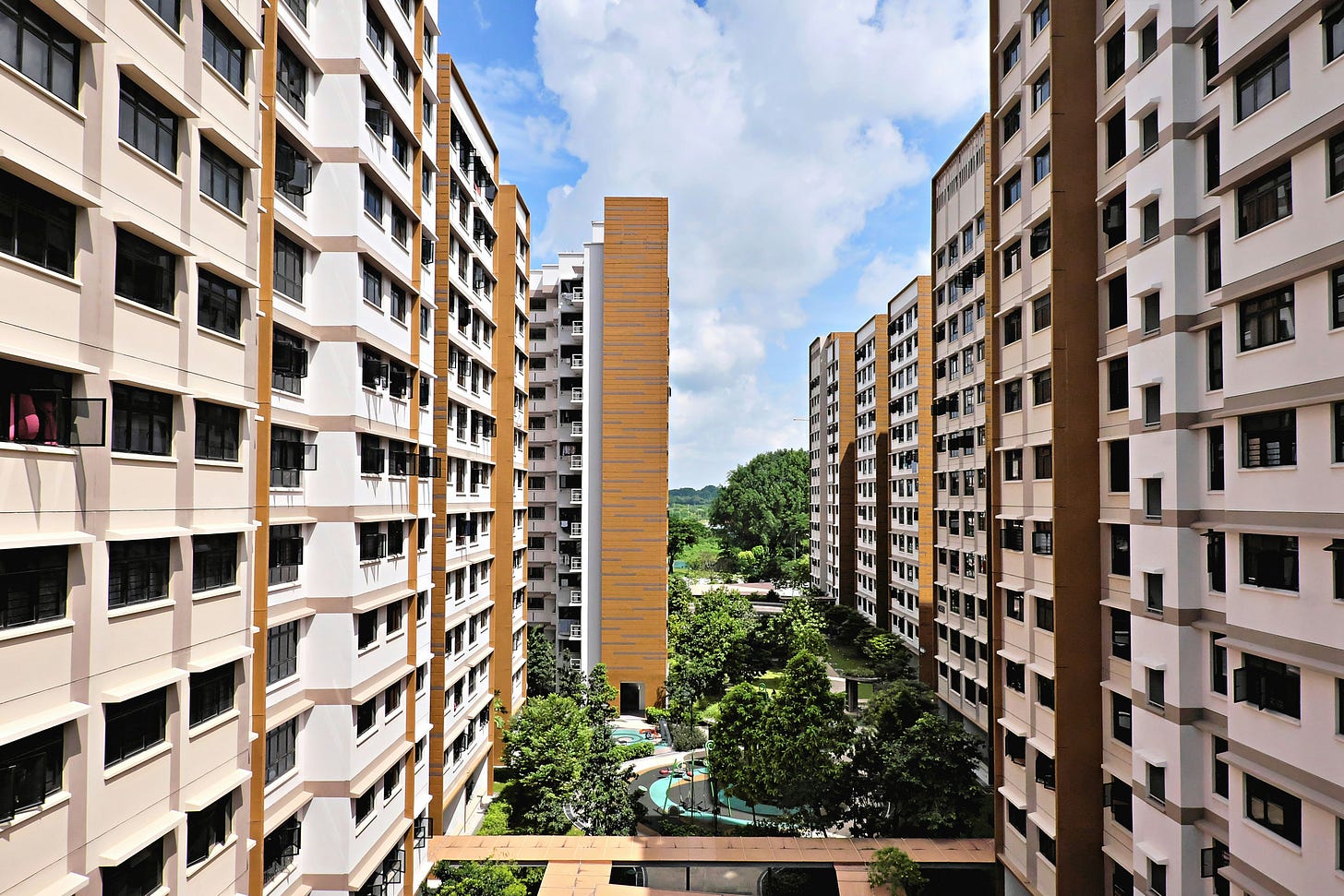
Q: In your survey answer, you highlighted three issues that matter deeply to you: mental health support, housing access, and legal recognition. Among those, which feels most urgent right now?
A: Housing. For sure. I’m in the process of buying a house and it's just so expensive.
Q: That sounds like a real stress point. Does that frustration around housing also tie into your experience as a queer person living in Singapore?
A: Definitely. Being gay means you can only buy certain types of flats after you turn 35. That’s already one barrier. And then there’s the issue of grants and financial support.
Yes, singles get some support, but it’s capped based on income. If you earn a bit more, suddenly you don’t qualify. And for LGBTQIA+ folks, we don’t have the option to get legally married, so we can’t apply for many of the schemes that couples can.
I get that there’s a push to support families because of things like the fertility rate — that’s a national priority. But LGBTQIA+ people work, pay taxes, and contribute to society too. We deserve some support as well. There has to be a better balance.
I don’t have a clear answer for what that balance looks like, but I know what we have now isn’t fair.
NB: “Affordable housing options for younger same-sex couples seeking to purchase their own property in Singapore are limited. Unlike many of their heterosexual counterparts, Singaporean same-sex couples do not qualify for most Housing & Development Board (HDB) schemes that require applying couples to be married or eligible to marry. This leaves same-sex couples to apply under the Single Singapore Citizen Scheme or Joint Singles Scheme.” - Singapore Legal Advice, A Space Between
Q: You also spoke about the importance of legal recognition. In your mind, what does legal recognition look like for someone living in Singapore?
A: For me, legal recognition is a lot more symbolic. If we ever reach a point where we have gay marriage or civil unions, it would be a big symbol.
But what’s even more important to me is acceptance by society at large. The fact that there are LGBTQIA+ couples out there living their lives together should be recognized and embraced.
That acceptance matters more to me than just signing a piece of paper to say you're legally a couple.
Q: So would you say that societal and cultural acceptance feels more important to you than legal recognition?
A: Yes, definitely. That has to come first. When society accepts us, the legal frameworks will naturally follow. Although in some countries it happens the other way around. They push for legal recognition first, and then acceptance grows over time, I still feel that social acceptance is the foundation.
Q: Since the repeal of Section 377A, do you feel that this acceptance has moved forward?
A: I think it has, definitely. People are a lot more open now. I meet people who work in the government who are openly gay. From my perspective, there's more visibility, and it's known and accepted. You also now have politicians who are willing to speak on LGBTQIA+ issues. Even smaller things like seeing LGBTQIA+ candidates running for office. that all shows a shift toward greater acceptance.
Q: Earlier, you alluded to a potential LGBTQIA+ candidate in the upcoming general election. How do you feel about the idea of a queer person stepping into that space?
A: I think it’s a good thing. Representation matters so much more when it comes from within the community. It’s powerful when someone who truly understands our experiences stands in Parliament and advocates for us.
No matter how well-meaning a heterosexual ally might be, it’s never the same as someone who lives that reality. Having someone from our community in Parliament shows that we belong here and that we are part of Singapore too.
Right now, our issues always feel like a side note. We have MPs who champion women’s issues, or migrant worker rights and that’s great. But no one is really standing up and saying, “This is a priority,” when it comes to the queer community.
Until we have someone in Parliament for whom this is a lived reality, not just a talking point, we’ll always be treated as an afterthought.
Q: Over the years, we've seen MPs make speeches during debates like the 377A repeal. Some of those speeches landed better than others within the community. Looking at everything, from Pink Dot engagements to how political conversations are shifting, do you feel that we're slowly paving the way for real progress?
A: I believe progress will come, it’s a matter of time. It depends on how patient we are willing to be. I do feel there's a trend toward greater openness, especially seeing politicians take on LGBTQIA+ issues and having candidates who are open about their identities. That kind of visibility will only grow. I’m cautiously optimistic that we’re moving in the right direction.
NB: The Ipsos Pride 2024 study, conducted across 26 countries including 500 respondents aged 21-74 in Singapore, highlights a strong trend of growing support for LGBTQ+ rights in Singapore, particularly among Gen Z and Millennials. For instance, 72% of Gen Z and 69% of Millennials believe same-sex couples can raise children successfully, compared to 44% of Gen X and 40% of Baby Boomers. - Ipsos
Q: You mentioned earlier that you feel cautiously optimistic about the future. Could you share a bit more about what that cautious optimism looks like for you?
A: Yeah, I guess it’s because when I look at the experiences we've had so far, I do see a lot more openness now compared to before. It’s slow, but it’s happening.
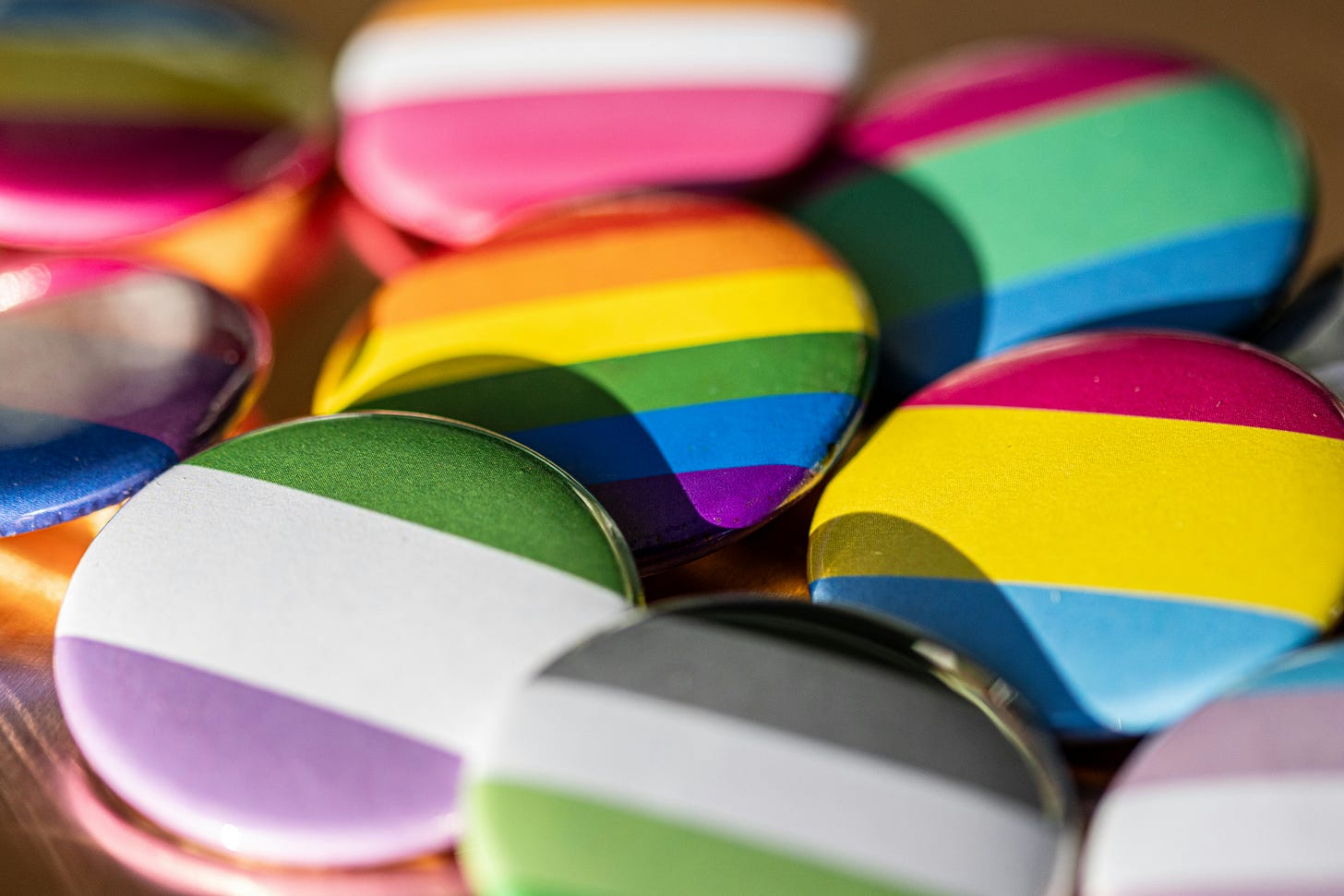
Q: You've also highlighted that mental health support is one of your top concerns, both personally and professionally. What does ideal mental health support look like to you for the LGBTQIA+ community in Singapore?
A: Honestly, that's something I’m still figuring out myself.
I know mental health and well-being are so important, but I also realise that just raising awareness isn’t enough. Awareness alone doesn’t solve anything. We need policies, infrastructure, and systems that actually make mental health support accessible and effective.
And I’m not entirely sure yet what the full picture of that should look like.
NB: Singapore launched a National Mental Health and Well-Being Strategy in Nov 2024, signalling recognition by the government that mental health has become a significant health and social issue. The strategy’s key thrust is to tackle the issue coherently and holistically, from both preventive and curative perspectives, through the community, schools and workplaces. - The Straits Times
Q: It's so important that you bring up the point that awareness isn’t enough. Especially now, with so much talk around mental health, on social media, in mainstream media, it feels like the infrastructure and policies haven't quite caught up yet. Would you agree?
A: Yeah, I would. And especially for the LGBTQIA+ community, it’s even harder. There’s still a lot of exclusion. Mental health practitioners often aren’t trained to understand LGBTQIA+ issues properly.
That lack of inclusivity adds another layer of difficulty when someone tries to seek help.
Q: Do you think that makes the burden even heavier for LGBTQIA+ individuals: that even though there's growing awareness, actual access remains such a big challenge?
A: Definitely. That burden is heavier for minorities, and even more so for the queer community.
For example, if you want to see a counsellor, you might have to wonder if they will be judgmental about your identity. Traditional social service agencies sometimes also have blind spots when it comes to LGBTQIA+ issues. So while awareness is there, real support can still feel out of reach.
NB: In a study conducted between November 2023 and January 2024, 79% of LGBTQI+ individuals in Singapore reported persistent feelings of downheartedness, sadness, generalised unhappiness, with an average PHQ-9 score of 10.46, indicating moderate depressive symptoms. Over 80% identified a need for mental health services. 43% expressed concerns about judgement or discrimination from service providers. Many were unaware of available mental health resources tailored for the LGBTQI+ community. - APCOM, Oogachaga, Mahidol University study in 2024
Q: Earlier you spoke about the hesitation that social service agencies might have when it comes to being openly supportive of LGBTQIA+ issues. Could you share a little more about what that tension feels like from your perspective?
A: Sure. So, even though I know many social workers and counselors personally, and I can see that they genuinely care and want to provide the right support, there is a kind of cautiousness at the agency level.
Agencies often have to be careful about how they present themselves, especially because their funding might come from sources that are not exactly ‘LGBTQIA+ friendly’.
Even when the government funds LGBTQIA+ programs, it is often quite restrictive. You cannot use the government agency’s logo, and you cannot openly say that you are supported by them.
It creates this strange dynamic.
Sometimes, people think that public service workers are all progressive, but the reality is a lot more complicated. The government is not just one entity with one view. It is made up of thousands of individuals with very different perspectives.
It is never as simple as saying "the government is supportive" or "the government is not."
Instead, I feel it is about trying to convince individuals within the system that the LGBTQIA+ community needs more help and more openness.
And yes, there are departments that are still holding on to very outdated ideas. For example, IMDA still restricts the positive portrayal of same-sex relationships. In education too, there are likely still restrictions, though I am not fully sure of all the details.
Different ministries move at different speeds. Some are a little more progressive, while others are still taking a lot more time. That is just the reality we are working with.
Q: In light of all that complexity, I am wondering: in your more cautiously optimistic moments, where do you think the community might find openings for progress and positive change?
A: Actually, I really think there are a lot of opportunities, if community groups are paying attention.
There are many (external) people who are supportive. Sometimes, the challenge is simply that they do not know what they can do. Even for me, sometimes I am not entirely sure what steps to take. Like, if I have the chance to talk to someone, what exactly am I advocating for? What are we asking them to support?
Marriage equality, for instance, still feels like a long way off. If you lead with that as the goal, it can feel overwhelming for people and the pushback might be really strong. It is too big a leap for some right now.
So then it becomes a question of, what are the steps in between? What can we work on now that builds towards that bigger goal? Honestly, after the repeal of 377A, the landscape feels a bit unclear.
Before, we had a very focused goal: repeal that law. Now, there is this big vacuum, and it can feel like there are so many directions to go, but no clear consensus on where to head next. It is something I have heard a few people express.
Even though this interview is framed around the upcoming 2025 General Elections, I think the reflections we are having can be a bit of a guide for community groups.
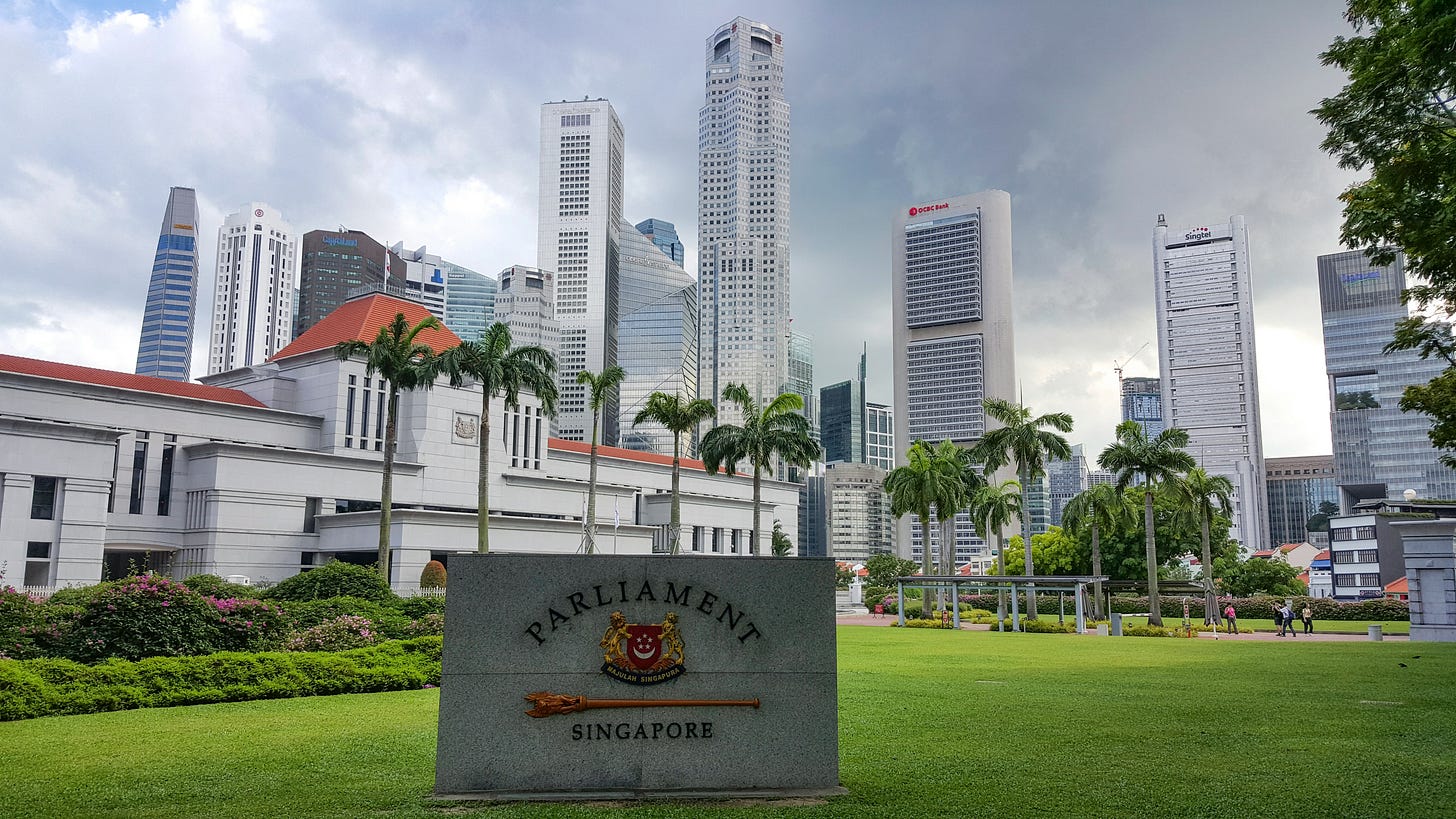
Q: As you think about the upcoming elections, and more broadly about what you hope for the community, what feels most important to you?
A: For me, honestly, I don't really expect LGBTQIA+ issues to be front and center in the elections.
General elections here are usually focused more on economic and bread-and-butter issues, because that is what most people care about day-to-day.
At the same time, when I think about what I hope for, one thing stands out very strongly: I do not want our political landscape to become deeply polarized.
I have been reading a lot of US political news recently, and it really struck me how toxic things have gotten there. I used to enjoy reading The New York Times because it had such thoughtful, critical journalism.
But now, every article feels so divided, so full of anger and blame. It is always either you are liberal or conservative, pro-Trump or anti-Trump, and there is so much hatred on both sides.
When politics gets that toxic, it is the ordinary people who suffer. The real issues, the real lives of people, they get lost in all that noise.
For example, during the Trump era, it was trans people who ended up being scapegoated for political gain. They were used and harmed, just to stir up votes and outrage.
That is something I really hope we can avoid here. I want us to find ways to disagree, even strongly, without turning every difference into a reason for hate.
I want us to keep sight of the humanity in each other.
Q: Earlier you brought up how people can become political scapegoats. I couldn’t help but think about the recent remarks by Goh Meng Seng, where he blamed the LGBTQ+ community for the low birth rate in Singapore. Would you say that’s the kind of scapegoating you were referring to?
A: Yes, that’s exactly what I meant. Thank you for reminding me, because I had honestly forgotten about that incident for a moment.
That kind of rhetoric, where queer communities are used as political punching bags, it’s harmful. It divides society. And when it becomes an “us versus them” thing, it fractures us even more deeply.
I really believe that if we want to see any real cultural shift, we need to find ways to have conversations with people who disagree with us. And I get it, that's not easy. For many queer people, these aren’t just political debates, they’re about their very identity and existence.
Speaking to someone who rejects all of that can be incredibly painful. But I also believe those conversations are necessary.
Because at the end of the day, we don’t need to convince people who already support us. We need to reach those who don’t see the LGBTQIA+ community in a positive light.
That’s how change happens.
Q: So when we talk about hopes for the coming election cycle: would you say your biggest one is that we don’t end up becoming even more polarised?
A: Yeah, I think that’s it. I just really hope this cycle won’t be driven by anger or hate. That’s not the way forward.
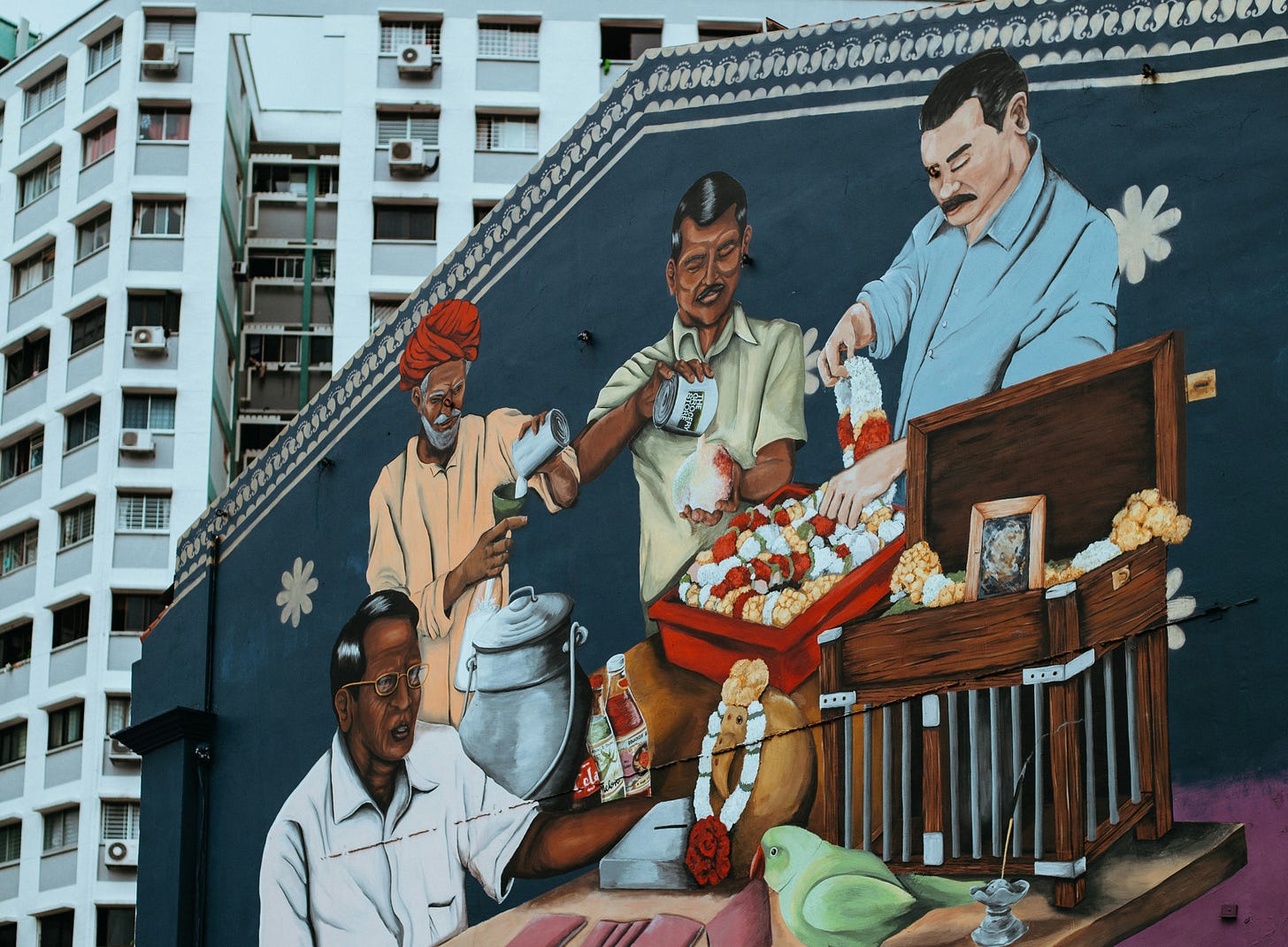
Q: Then what do you think should be driving our political conversations instead?
A: I think we need more constructive dialogue. We need to accept that not everyone will agree on everything and that’s okay. There should still be mutual respect. We should be able to advocate strongly for what we believe in, and still sit down and have a meal with someone who sees things differently.
Q: That really resonates. But let me gently push this a little further — do you think that kind of respectful disagreement actually leads to progress? Or does it risk keeping things stagnant, where only one group benefits?
A: That’s a good question. I think we need both — we push for change and also remain open to conversations. Otherwise, we risk becoming the very thing we’re fighting against. That’s the tension, right? It’s not easy, but I believe it’s necessary.
Q: You’ve mentioned keeping an eye on overseas politics too — particularly in the States. Has that shaped how you view what’s happening here in Singapore?
A: Definitely. I read a lot about US politics, and the polarisation there is so extreme. It’s really shaped the way I hope things don’t go here. You can see some of that creeping into our own discourse like in how certain manifestos are being framed now.
Q: Are you seeing this locally already?
A: Apart from the Goh Meng Seng incident, not too much. I think most of the opposition is still pretty reasonable in their tone. Whether or not I agree with all their ideas, the conversations are still fact-based. Sometimes, I think it’s the ruling party that can be more heavy-handed in their messaging. But overall, things haven’t reached that level of hostility… yet.
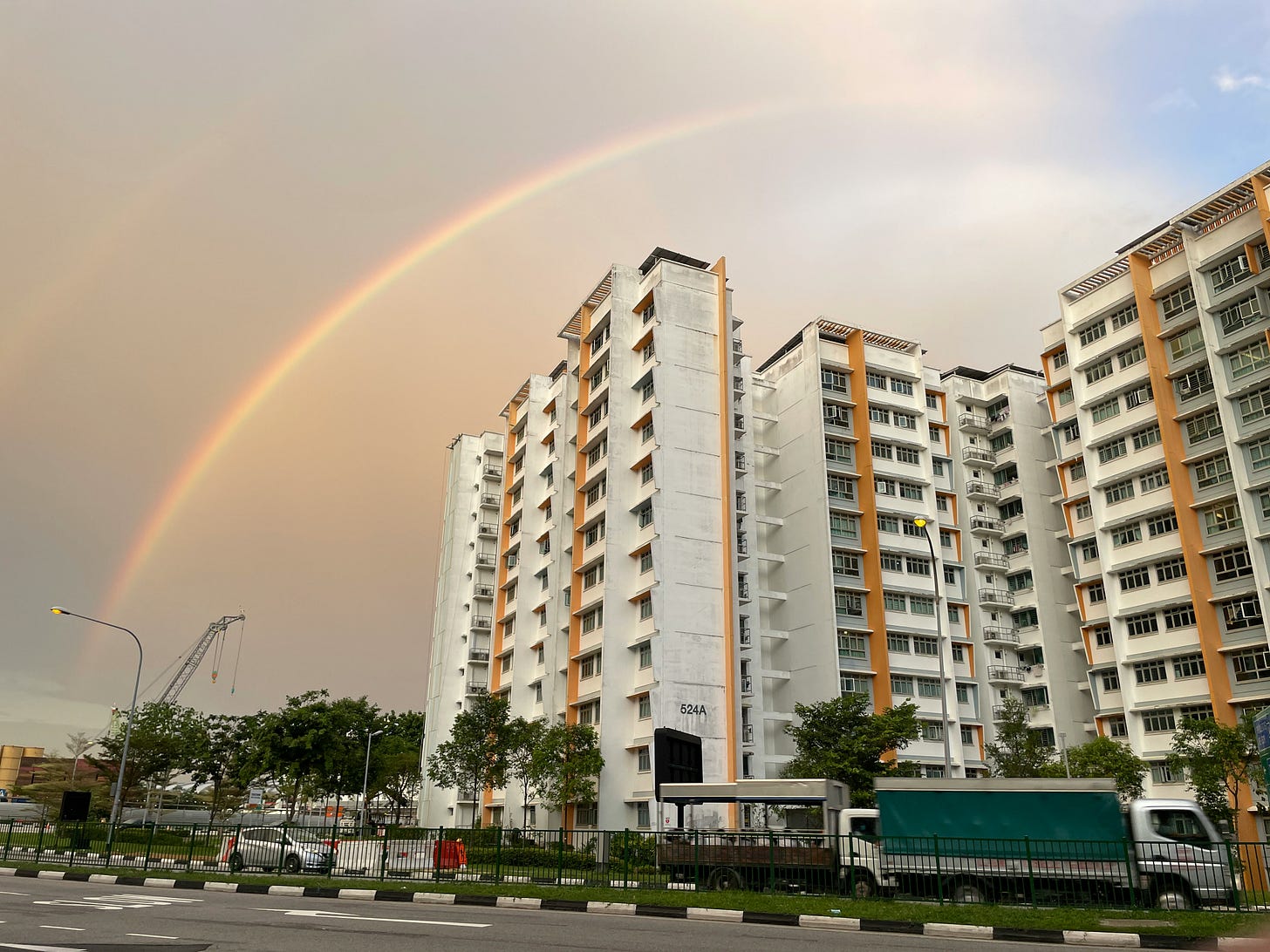
Q: Okay, let’s shift gears a little. Just for fun: if you were elected into political office in Singapore, whether as an MP or a minister, what would your top priority be?
A: I’d really want to focus on mental wellbeing. But not in a surface-level way. For me, mental wellbeing is connected to everything: economic policy, housing policy, social policy.
You can’t talk about mental health without addressing the conditions that shape people’s lives.
I feel like the current government tends to be very mechanical in its approach. Everything is KPI-driven, all about efficiency and outcomes. And yes, those things are important but when it comes to mental health, you also need ‘heart’. You need to understand people.
Q: So you're saying it feels too much like a corporation?
A: Exactly. It feels like we’re managing people like resources, not humans. And I get it — when you’re running large programs or initiatives, sustainability matters. But if we forget why we’re doing these things, we lose the soul of the work.
That’s the tension I wrestle with: how do we balance the efficiency needed to sustain programs, with the heart that keeps them grounded in purpose?
Q: That’s such an important point. So if you had to start somewhere to improve mental wellbeing in Singapore, where would you begin?
A: Honestly? I’d start with the civil service. They’re the ones creating the policies. And from what I’ve seen, they’re also some of the most stressed out people in the country. If we can improve mental wellbeing within the civil service itself, we’re setting an example and we also get a huge test bed to see what really works.
NB: There is existing mental healthcare support for public officers. They can seek reimbursement for medical treatments for mental health conditions prescribed by doctors registered with the Singapore Medical Council and carried out at hospitals/ clinics licensed under the Private Hospitals & Medical Clinics (PHMC) Act, subject to the prevailing guidelines. - Chan Chun Seng, Minister-in-Charge of Public Service.
Q: Thank you for sharing so openly. You’ve really balanced both heart and realism in what you’re saying. It’s not just about idealism; you’re clearly also thinking about sustainability, structure, and competence. That’s not an easy combination to hold.
A: I appreciate that. These are things I’ve been thinking about a lot, especially in the past few weeks.
Q: What’s been weighing on your mind: the election itself, or something bigger?
A: More the “what’s next” question. The election is just one part of it. I guess I’ve been thinking about how real change happens. I run a ground-up initiative, and we’re very good at doing the groundwork: building community, creating programs. But how do we translate all that into policy and structural change? That’s been sitting heavy on my mind.
Q: Thank you. This has been such a meaningful and thoughtful conversation.
A: Of course. And thank you. This has been really clarifying for me too. These are thoughts I’ve been sitting with, but talking it out helps me better understand what I actually believe.
Sherman Ho is the co-founder of Happiness Initiative, a research-based social enterprise that focuses on making well-being skills accessible to everyone. His focus lies in translating well-being research into engaging programmes and products that are interactive, inclusive, and designed to empower people from all walks of life.
Sherman’s interview doesn’t offer easy answers. And that’s exactly the point. His reflections on leadership, housing, mental health, and queer belonging ask us to go beyond surface-level debates and really consider: What kind of society are we shaping, and who gets to feel at home in it?
Are our policies truly inclusive, or do they still ask some of us to shrink ourselves to fit? Can policies that benefit the nation, can also benefit the LGBTQIA+ community?
As the election season starts and ends, it’s tempting to cling to loud slogans, memes, or rally lines. But maybe the deeper work lies in sitting with discomfort, listening longer beyond these nine days of campaigning.
Sherman’s voice is one among many but it reminds us that real change begins when we’re willing to ask harder questions.
Disclaimer:
The views and opinions expressed in these interviews are those of the individuals themselves and do not necessarily reflect my own. This series aims to amplify a diversity of voices within the LGBTQIA+ community. No single conversation can represent the full breadth of our lived experiences.
Once again, my heartfelt thanks to all the interviewees for trusting me with their stories.


